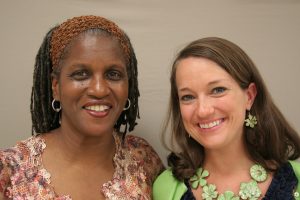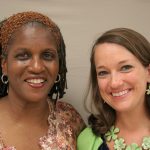Venita Barnette and Erin Berglind
Description
Colleagues Venita Barnette, 53, and Erin Berglind, 31, talk about their love of teaching and the experiences they've had as teachers.Subject Log / Time Code
Participants
- Venita Barnette
- Erin Berglind
Recording Locations
Whale Branch Early College High SchoolVenue / Recording Kit
Tier
Partnership Type
OutreachInitiatives
Keywords
Subjects
Transcript
StoryCorps uses Google Cloud Speech-to-Text and Natural Language API to provide machine-generated transcripts. Transcripts have not been checked for accuracy and may contain errors. Learn more about our FAQs through our Help Center or do not hesitate to get in touch with us if you have any questions.
00:06 My name is Erin Berglund. I am 31 years old. Today's date is May 31st, 2012. We are located in Seabrook, South Carolina. And I am talking with my friend and colleague. They need a Barnett. I'm 53 years old. Today is May 31st 2012.
00:30 We are in Seabrook, South Carolina. I'm speaking with my friend and colleague Erin Berglund and we work together to school at Red Cedar Elementary. What do you think makes a great teacher?
00:50 I think a lot of pieces and answers to that puzzle call teacher in. The first one is a compassion for children and caring about their future.
01:02 And just the ideal of helping them and encouraging to be the best they can be what do you think makes a great teacher. Vegas things that makes a great teacher. Is it just being a passionate person about what you do and what you think is important for students in and looking out for their best interest and just making sure that you know, they're getting everything they need to be successful Learners and just making sure that you are there for them that you are, you know, you're not you're not taking the place of their parent or anything like that. But you're you're definitely there for them and in a way that only a teacher can be there cuz you know parents send their children to the to school and we spend more time with them. Honestly, then they spend with their families a lot of time and it's a huge responsibility and I think having a person understand what type of responsibility that is is.
02:02 What's the next question we had was there a student who is Tachi the most or what? Is there a student who is talk to you a lot tell me about that student with so many of years of teaching. I can't just say one student, but I can say the difference in the locations of places that I thought. I done learned a lot from different students and a big thing for me is I spent the majority of my teaching career in inner-city schools and what I found is that
02:37 You they let you know whether you're effective whether you or love or whether you're just there for a paycheck, they taught me that.
02:46 You can take Dunkin Donuts into them just to teach them how to write about different things that they tasted their touch.
02:56 But what comes out of their writing and their eyes in the look is like a thank you. You didn't have to buy me Dunkin Donuts, but you did and the little things that people would the suburbs take for granted children in the inner city school. They embrace it and they love you to sit and read a story to them and just care talk to them about their family and their life that has really kind of humbled me as a teacher one of the field trips that I went to what I was teaching in Newark Newark New Jersey was to the Bronx Zoo. Well the Bronx it was really an hour away children never been to the zoo. They would see different animals. And again, we take that for granted, but they were like
03:47 Blown Away by The Experience, they just kept hugging me and we're not talking little people were talking middle school children. Just thank you. I really never seen a giraffe and I just have to say that often times that when I become a little full of myself. I remember that working in the inner city students with inner-city students and their families. It's really sometimes they get a bad rap because they care they love they give us the best that they can of based on what they know and it makes me just said that
04:27 Sometimes we can't reach them all about you Aaron here in South Carolina, and I'm amazed at the the number of students that even like within our school. We're not in an inner-city school. But with the number of students to have never experienced the beach like I'm like the beaches 20 minutes away. How how have you never experienced that and you know, it's such a it's such a neat opportunity to light be able to to be able to take your kids and have field experience is like that and just and just provide them with those kinds of experiences with a question of like a student who taught me the maze there's
05:18 There's any in there. Like you said there is hard to pick just one Nina I've ever shared with you before when we've talked about my very first year teaching having a stye and it was probably one of my biggest challenges my very first day of school as a teacher and I've only talked for five years or no 6 years and and my very first day a little girl came up to me and she was a little African American girl and she came up to me and was very distant with me and I I didn't understand why and I just I I kept trying to reach out to her and finally I pulled her aside and I said, you know, is there something wrong? You know, what are you upset? Is this the shoe the first grader? So that's a hard transition. Anyway, just going from kindergarten to first grade. So I was trying to reach out to her and she said well, I miss Berglund my my daddy told me I can't trust a white lady and I
06:18 Was very shocked and taken aback by it, but I didn't quite know how to respond to it. And I remember I made it my goal to like reach out to this particular student and I'm really, you know, make a relationship happen with this child and Xena by the end of the year. I got daily hugs from this child. And you know, I remember saying to her when she said that to me we'll do you believe that and she said, I don't know and I said to her what I'm going to do my best to make sure that you always know that you can trust me and you know that you can you can always depend on me and that was one of the most it was amazing that that would happen on my first day of teaching and it was one of the most poignant moments of my teaching career on the very first day, you know experiencing that and that child is now in sixth grade and our 7th grade and and she
07:18 I still kind of write letters back and forth with her every once in awhile and have a great relationship. And for the three years that I stayed at the school that she was the three years after that. I stayed at the school. She came and hug me daily and and and always thanked me and you know for for making sure that she knew that she could trust me and I really don't think race had anything to do with it. I think she wanted to see what kind of relationship of reaction she could get from me and hopefully I gave her the right one to question. How do you build that trust in your students with you is like the most important thing that you have to do as it as a teacher when you when you reach out to students and when you you talk to them about their daily lives what they're involved in you ask questions. You don't go into the job.
08:18 Hanging out. I just have to teach a b and c but you're all still teaching life skills and you're teaching them how to be human and how to be you know, how to interact with other people and especially as an early childhood teacher that such a huge part as you know, they're coming to me fresh just from their parents, you know, I teach Kindergarten now and there I mean very few of them if they had experiences Beyond just their home life and and you know your family in my in my opinion loves you no matter what and you know, no matter whether you're making the best choices are or not here your family is supposed to love you no matter what and that's what I always hope for my students that that's how their family is. But then at the same time, you have to treat them how to teach them how to treat other people and you know, and how you get respect as by giving respect to the students and Justina.
09:18 And teaching them and modeling that for them and making sure that they understand, you know, I respect them as as individuals and that they have their own individual talents and skills and
09:31 I just I am try my best. What about you? What are you think it is is you teach the younger teach me a little older 5th and 4th graders. And I think trust for them is not necessarily something that you can say. Oh, you can trust me that you have to prove and I found out over the years. It's making your yes. Yes, and your no no and that fine area of Grey that we adults tend to play with that their children don't like gray. They like it if they like black and white and they like your word to me your word. Even if it's a negative consequences. It's just a follow-through and I'm finding that even with this generation of children in spite of what people may say about them. It's if your word is your word that you have that you don't have to buy them or threatened to do this or bad or not get this or that it's if you say you're not going to go to recess today because if your behavior well they respect.
10:31 That they may not like it but there's a respect so I'm finding that at red cedar that the word respect is like true to us because
10:41 The students get the respect. I tell them you start off day one with respect for me that it's up to you for us to have complete trust and respect that you can lose mine. And I know I make you can lose yours, but I'll do my best to give you my best and that's all I ask is them and we all know when we fall short, but we also know that children are perfect and they make mistakes. So the room for error is there but I think that because I'm being fair to them. I think I feel fair and I think they're being fair to me that when we fall short the consequences aren't as rigid to May for them as somebody else may think they should be because it's a build trust and a belt respect for right or wrong or each kids story is different. So I think it's the same, you know, the older they get it's just being true to them.
11:37 Wine eggs and piggybacking off of that of being honest to and you make mistakes. I mean, we're human too. And I think I think my students appreciate it more when I will admit to them. I'm human I make mistakes, you know, I'm a come in and have a bad day too and you know, and I always try to apologize and give them my best but you know being real with student I think is one of the biggest things to to do to test a ballast trust as they're getting older and getting ready to go through the middle school process to apologize to a fifth grader in front of their peers you talk about build up self-esteem self-confidence apologized in front of the whole class. I make it a point when I'm wrong. I make it a big issue because I want them to see that it's okay to apologize for being wrong and asking someone to accept an apology and tell them that you know, I didn't intend to hurt your
12:37 Dillon's or I didn't intend to do that and it's just keeps us humble to as adults that yes that your classroom and yes, you may be in charge, but you know what? I'm not perfect and you deserve that.
12:51 You and I've talked a little bit about the school that we both teaching red cedar. How do you think that the school that we teaching now is different from the school that you grew up in.
13:03 Well funny you asked me about growing up because I can't say I grew up in one school or two schools or three schools are for school because my father was in the Air Force, so I was born in Ankara Turkey and I remember being in California, Spain, Ohio, Massachusetts and with my dad retired from the Air Force. He's from Hilton Head. So he retired in Hilton Head and it was a culture shock to me that it was the majority of the students in the school were white. We had minority black. However,
13:40 In Middle School through high school year track based on what your future entails and I was going to college so there were four black kids in a classroom. And so if I look at that in and say, okay only for black kids that are destined to go to college no way today. I look in the classroom, which is in the same location Bluffton, South Carolina and I see a Melting Pot in the classroom so much diversity. It's amazing how Hilton Head Bluffton has changed over the years since I was in high school middle school because I can't walk into class and say there's only going to be for black kids because there's going to be Caucasian African-American his headache. I'll be leaving the young man. That is now from Germany. So it's
14:38 Change is good. And so red cedar opens up.
14:42 Adore for students to learn about others culture in to respect them for their differences and who they are and not to not to be offended by whatever beliefs a person has what do you think about red cedar compared to where you grew up suburban area say, I mean, I grew up in the area Irmo South Carolina and and the the school that I grew up and I mean we had we had a good mix of of ethnicities and how it was with somewhat diverse, but it was majority Caucasian and and it was a Amor higher-income area eating my first it was one of the things that I think is very interesting about this entire school district is you've got such a diverse population across the board. I mean you've got your
15:42 I work a lot and we have some areas of the district that are lower socio-economic and then you've got some that are more high-income like on Hilton Head there and then you've got some more Suburban kind of areas like Bluffton, but then you got your more rural areas like where we are today. It's a little bit further out. So I mean, you've got a very diverse type of population that the whole District serves and I've worked in one school that was more of a rural school and then at Broad River and then transferred over to Red Cedar and and that I would say red cedar is probably more like my school was when I was younger just because the big school and there's you know, it's more in the center of town and it's a small town, nothing but then at the same time, it's very different because we do have such a such a huge diverse population. We didn't have as much as much diversity as we do.
16:42 I'm at red cedar growing up. So that was just dumb. It's a it's different. It's definitely different and then of course she met with the way technology has come around. That's a huge part of our our school culture. I mean every classroom has a Promethean board and teachers are encouraged to use technology and we didn't I mean we had over heads and we had computers and I remember like the game Oregon Trail but like that was such a very basic, you know, the Commodore 64 kind of computer.
17:18 That technology has definitely taken a huge has changed the way education and the way schools are are are functioning as I just think that's been kind of neat. One of those things that I wanted to ask you about. I am obviously starting a family and I'm pregnant with my first child and and you have had many children for three children. You have three children and they're in college and out of college and you know, they were at different stages in our life and I guess my question is is how his family impacted your career as a teacher. That's a good question, especially for you because you're a high achiever an overachiever. So it a balance and making sure that
18:17 Your family comes first because you know, they love you. They support you you go home to them, you know.
18:25 But your job is important too, but you don't want your job to defined to defined you at this point is you become a mother because the students will love you and not know that you didn't spend 12 hours in the school 9 hours and so for me to you I tell you that not to forget your family put them first and don't make
18:49 Dude, it's not. Make your students. Wait, but don't make your family wait, tube make those memories that need to happen. For example, if your son has even if people call it a little tea with their mothers at school when he's in K1 or K2. However, you have something going at school. Well.
19:09 Your son's first, and I think that's going to be for me if I had the outside looking at you. That would be your horse and gets the balance because you want to do what is right by the children. However, you have one now, too, and I feel that people like me, and there's many of us and building were grandmother's if that ever happens, and I'm in the building with you and you don't know what to do with your students, please please please make you come hang out with us, and I think just to learn and just to use your time. Well the time you spend with your son and your as well as your husband.
19:48 Make it the best time to make it to that. I'm going to vent I'm going to do this. I'm going to do that. No, give them that love and that encouragement in that support that you give the students as well and just know that yet. Maybe I didn't make everything perfect in the classroom today, but I did my best and that's all anyone can ask you ask for me the principal teachers and students. They won't know that our overachiever didn't spend as much time with my classroom. You know, I just feel that young people aren't balancing the as well as they should and it's just some things like well maybe every piece of paper on your desk isn't straightened up will go home. Anyway go home and love you kids and go home and love your family and you don't want to not give them that attention because you don't we don't want you to resent your job.
20:42 Because then you burn out so finding that balance and then taking time for yourself. I think that's going to help you a lot. And because you always strive to be the best that you can be your son. Your son is not going to see that my made a mistake your son is going to love you unconditionally and soap for me to you. I said give him your best whatever that is and leave the school at the school.
21:09 You know, I I definitely feel like in a teaching has helped prepare me for being a mom and and just especially with working with young children. It it's it's me to be able to see how like they grow in developing and then also, you know interacting with parents that's a huge huge thing, you know, and of course, you know, you always say what I'm not going to be that way or are you say that about your own parents or you say that about like your siblings when you see them interacting with their children, but but it definitely has like giving me a totally different perspective on like how it how to kind of approach parenting and and just making sure that I'm doing the best I can and I thank you for your advice. I'm excited for you and I look forward to it to another little child coming into red Cedar's life. You know, it's just it's money for people like me and the other
22:11 Other grandmother's in the building to watch all of the excitement on your faces and I got to go home now in to watch that. It's sometimes it doesn't happen enough to in the building that young mothers in a saying, you know, I have to go now one little piece of advice you didn't ask me for but that you're getting anyway is that when you go on a little vacation or spend time the way you're allowed not to check the school email. I just thought I'd throw that in Boston Marathon.
22:43 Did you have any other questions that she wanted that so I can pick your brain a lot since you're just from South Carolina. Do you think that there's more opportunities for Hands-On experiences for students in the Lowcountry or where you were in Columbia?
23:02 What I think at one of those things they said that obviously is is attractive about Colombia is the Central and I like the central location that you you know, if you could have Hands-On experiences, you've got lots of places the center of government is there so you can go see the state house and then you've got also the State Museum right there for the end adventuring. There's lots of I mean it being a city there's there's lots of opportunities for Hands-On experiences for students, but it's a totally different type of hands-on experience. Then what you're going to get on the Costa mean you can experience the beach from PI. You can experience the Lowcountry and all the beauty that there is here and there's a lot of Rich history in the Lowcountry as well. I mean, you've got the Charleston area where he knows where some of our country began, you know, so you've got a lot of history there as well. You know, that's one of the things
24:02 I do love about South Carolina is that you've got a wide range of of experiences that you can offer students no matter where you live. And that's one of the things that's nice about it being a small state to as you can travel, you know, obviously budget restrictions, keep us from from being able to do as much traveling nowadays with with our students and getting them to experience those kinds of things. But I think you know, you're going to have different types of experiences but not necessarily more or less or better quality or less quality. It's just it's a different experience. Do you find do you think or predict that
24:43 With technology going the way it is that students will have more opportunities for at a field trips or do you think you'll have virtual field trips in the future? And you think it will be the same experience as being at the place? I don't think of Virtual Field Trip can replace that the actual real experience, you know, it's a great it's a great thing to have for those those situations where you don't have the financial means to get students places, but nothing can replace like the real true experience and you know technology is great, but it's but it's still limited and it still limits what were able to do.
25:24 And life experiences are huge for students. And that's what they're going to connect to us the most so and on the same line, do you think because of Technology students with video games and computer games in Facebook and everything? Do you think that their families are going away from making memories and students are dealing more with technology or what? Do you think your opinion? It's interesting you ask that like I definitely think that like, you know, I don't know I'm a big Facebook Ur and I you know, I put I I have events in my life and I put pictures up and you know, it's a way it's it's been a way for me to stay connected with people that I wouldn't necessarily of stay connected with in it like I mentioned to you on the way here that I have a high school friend who teaches in the area that I would have never known. He's hot in the area if I hadn't, you know seen it on Facebook kind of thing and it's it's one of those things where I think it's
26:24 Integrate technology and & in the way communication has changed is a great thing, you know in that we can keep connected with each other, but I think it does somewhat take away from the experiences of a really truly interacting and with the people that are right there with you because I'll be on my phone my cell phone looking at my Facebook account as opposed to you know necessarily talking to the person. He's sitting right next to me, which is that that that's unfortunate that he knows we tend to lean more towards that kind of interaction and then then really interacting face-to-face in person to person but you know, it is definitely has its place but then again like like everything in life, it needs its balance. You got a balance that out with with being true to who you are and interacting with the people that are around you.
27:20 I agree. I have to say that I had an experience and I'm not talking experience with the students. This is more with family members up with people over 40 we decided we were going to go on a little family field trip and I decided that all everybody knows this what everybody doesn't know this that & Harbor Town on the 18th green. There's a graveyard and Cemetery I should say and my family is buried there like 40 years ago years years like many moons ago. And as I was taking him on this field trip to the 18th hole they didn't really believe me so we get to this and they see Grace from 1826 and they're like, how did you know this and I was like, this was told from the family and this is a place in Harbor Town. We were always tell don't forget. The other people in Harbortown have asked the family to move that cemetery and they would pay of course. We said no, but as I sat there listen to you talk about face.
28:20 Good memories and everything and like, you know, it's things like that that will forget. If you don't you don't take someone to physically say, okay this exists and my children my grandchildren this is happening until I hear what you saying and just talking to them. They didn't realize that when we talked about it. I was serious. But when they saw it there, you know, they were moved by scuse me. I think it's important what you said and I do agree and I just think that as teachers we all just have to pass information to each other. We were sitting next to each other just so we don't forget about this whole project. Here's got to tell the stories and just got to keep you got to keep those stories alive.
29:12 Alright. Well, thank you Benita for talking with me today.





